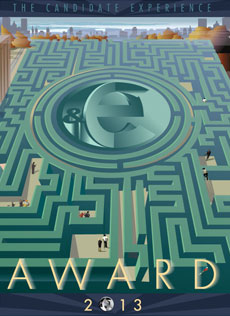 Besides the fact that treating your candidates with respect is the right thing to do, there are also some solid and important reasons for creating a positive candidate experience that can and likely will affect your bottom line as a company. You all know that WIIFM stands for “What’s in it for me?” Well, WIIFMC stands for “What’s in it for my company?”
Besides the fact that treating your candidates with respect is the right thing to do, there are also some solid and important reasons for creating a positive candidate experience that can and likely will affect your bottom line as a company. You all know that WIIFM stands for “What’s in it for me?” Well, WIIFMC stands for “What’s in it for my company?”
Data from the 2013 Candidate Experience Awards conclusively shows that a positive candidate experience increases the number of candidates who will reapply, refer others or will purchase your products, all of which have an impact on the company’s quality of product, productivity and revenue.
In most cases, the candidate experience really begins with clear communication – from the information provided on the company, its culture and about the job itself to the communication a candidate receives on the status of their application, next steps of the process and most importantly, feedback on why they were not select for the job.
The most common complaint among candidates is that they just don’t know where they stand during the application and screening process. Companies that provide some sort of feedback to candidates are ahead of the game, but what really seems to make a difference is the personal aspect of how that information is delivered.Nearly half (42.9 percent) of companies that won a 2013 Candidate Experience Award required that their recruiters provide either scripted or unscripted feedback to unqualified candidates.That is pretty powerful, but even with an automated message, in a timely manner, businesses can meet candidate expectations by letting them know where they stand. It is the “not knowing” that causes the most frustration and will keep that same candidate from applying to the jobs for which they arequalified.
Another area impacting the quality of candidate experience is the job description itself. If the job description does not accurately reflect the type of skills or experience required, it will attract the wrong candidates and waste a lot of peoples’ time – including the candidate’s, the recruiter’s, and the hiring manager’s just to mention a few. On the other hand, if the job requirements, necessary skills and experience are clearly conveyed, ideally you will receive a more qualified candidate pool and in the long run, a more productive new employee who can directly affect the company’s bottom line.
Candidates and new hires who were treated well during the hiring process are also more likely (62.5 percent) to refer people to your company; people they think would be a good fit even if they didn’t get the job themselves. In contrast, people who report that they were treated poorly during the hiring process (27 percent) would actively discourage their friends from applying, negatively impacting the company’s employment brand and ability to attract some possibly well qualified candidates.
Candidate experience also has the potential to impact a company’s sales. The CandE Awards research data showed that approximately 60 percent of candidates felt they had some sort of relationship with company to which they were applying. When they were treated well, 38.8 percent of candidates indicated they would be likely to “increase their purchase power” versus those who reported that they were not treated well (30.8 percent) and said they would take their purchase power elsewhere.
Would you like to know where your company stands? You can apply to the 2014 Candidate Experience Awards to receive complimentary benchmark data to see exactly where you stand. It is easy and FREE! Registration and the Employer survey must be completed no later than May 12. Try it and you will find out WIIFMC.
Read more at the Candidate Experience Awards
By Denni Oravec
Recruit Smarter
Weekly news and industry insights delivered straight to your inbox.




